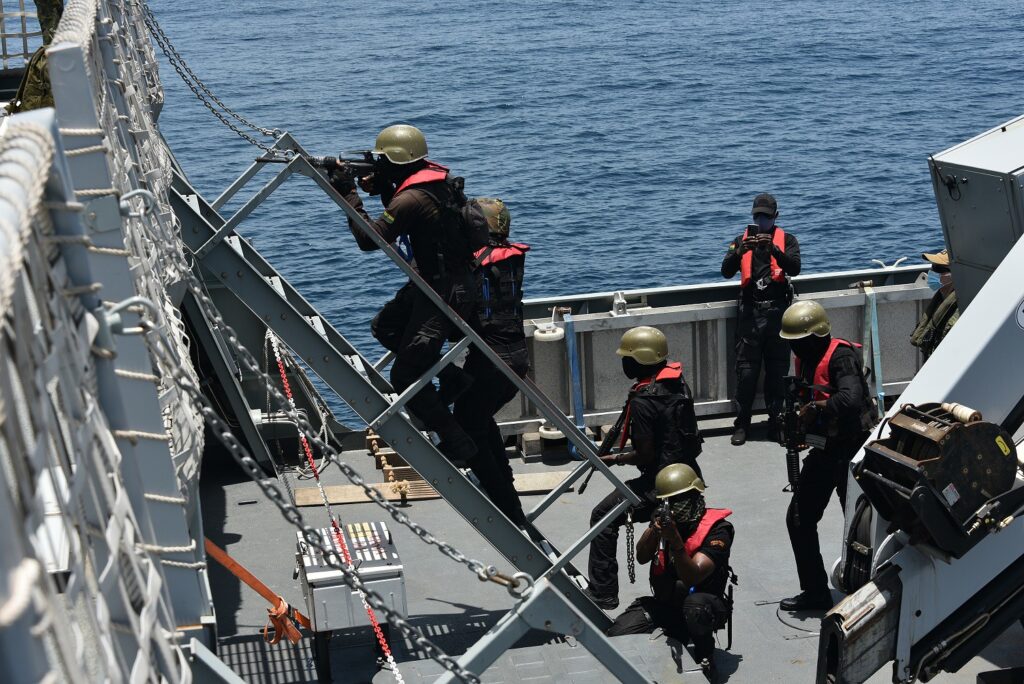ADF STAFF
When Cmdr. Prince Boateng, a Ghana native, returned home in March, he wore a U.S. Navy uniform. He was part of Obangame Express 2021 (OE21), a 13-day maritime security exercise sponsored by U.S. Africa Command (AFRICOM) and conducted by U.S. Naval Forces Europe-Africa. It included participation from 31 nations, 20 of which were African.
Boateng, a reserve in the U.S. Naval Forces Europe-Africa/U.S. 6th Fleet, understood firsthand the importance of the exercise hosted by the Ghana Navy.
“We’re here to help the Ghanaian Navy and the navies in the Gulf of Guinea to work together to help them protect their own resources and make sure the resources are going to the right people, the people that it belongs to,” Boateng told American Forces Network Europe (AFN Europe). “I’m very emotional to get an opportunity to wear a U.S. Navy uniform in the place I was born.”
The goal of OE21 was to enhance regional cooperation, maritime domain awareness, information-sharing practices and tactical expertise in countering illegal, unreported and unregulated (IUU) fishing, piracy, terrorism, drug and weapons smuggling, and human trafficking. The exercise ended March 27.
Maritime training exercises on the Gulf of Guinea and Atlantic Ocean included boarding techniques, search-and-rescue operations, medical casualty response, radio communication and information management techniques. Ghanaian, Danish, Dutch and Polish troops also participated in a shooting technique exercise on urban terrain.
Other participating nations included Canada, France, Germany, Italy, Spain and the United Kingdom.
Ghana Navy Cmdr. Yussif Benning, acting director of the Economic Community of West African States MultinationalMaritime Coordination Center, said OE21 helped African nations leverage their strengths “to partner with your friend or neighbors so that you have a much more holistic security environment.”
“It’s an opportunity to gain more skills to enhance our collective understanding, build trusts at personal and institutional levels,” Benning told AFN Europe.
U.S. Navy members trained participants to use Sea Vision, a web-based tool that lets users view and share an array of information to improve maritime operations. Created by the U.S. Department of Transportation in 2007, Sea Vision is an unclassified maritime domain awareness tool requiring only an internet connection, username and password. It lets users track commercial vessels globally using data gathered from coastal radar, satellites and other sources.
Sea Vision has allowed nations to share information across borders and coordinate efforts to respond to threats such as piracy. “From Angola up to Mauritania and Morocco. Everyone has one or two accounts. They use it and pass information back and forth,” said David Rollo, maritime domain awareness project manager for U.S. Naval Forces Europe-Africa.
Obangame helps maritime domain awareness professionals work together in a scenario that mimics real-life threats. Before Sea Vision, “we had no way of having a common operations picture with our partners when we were doing these exercises,” Rollo said. “So it can get a bit dangerous if you don’t track your forces. So it was not only for our partners to use but for us to use.”
Abundant natural resources and a lack of maritime security make the Gulf of Guinea susceptible to crime. About 40 tons of cocaine pass through West Africa annually, according to the Organization for Economic Co-operation and Development. Piracy, IUU fishing, and weapons and drug smuggling all are increasing.
“Obangame Express is good for all the navies participating in it,” Ghanaian Coast Guard Lt. Cmdr. William Kofi told AFN Europe. “It will help bring us together, especially for the West African navies, so that we can tackle the various crimes that are confronting us. The various countries, alone, cannot take care of the maritime security situations that we have.”
OE21 also featured a virtual pandemic preparation and response exercise that included medical experts from Côte d’Ivoire, Gabon, Ghana, Liberia, Nigeria and Senegal, as well as the U.S. and the U.K.
Participants exchanged lessons learned from COVID-19 and previous epidemics.
“The objective of the engagement, like Obangame Express 21, is to increase regional cooperation and interoperability. This event focused on how we can do that from a medical perspective,” said U.S. Navy Lt. Amy Welkie, the event’s coordinator. “This allowed us to establish and build partnerships with our medical counterparts across the Gulf of Guinea.”

